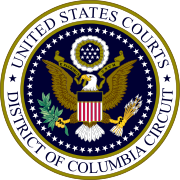Microsoft antitrust trial
| United States v. Microsoft Corp. | |
|---|---|
 |
|
| Court | United States Court of Appeals for the District of Columbia Circuit |
| Full case name | United States v. Microsoft Corporation, for committing monopolization |
| Argued | February 26–27 2001 |
| Decided | June 28 2001 |
| Citation(s) | 253 F.3d 34 |
| Case history | |
| Prior action(s) | United States v. Microsoft Corp., 97 F.Supp.2d 59. (D.D.C. 2000), direct appeal denied, pet. cert. denied, 530 U.S. 1301 (2000). |
| Subsequent action(s) | Microsoft Corp. v. United States, 534 U.S. 952 (2001) (pet. cert. denied); 231 F.Supp.2d 144 (D.D.C. 2002) (on remand), aff'd in part and rev'd in part, 373 F.3d 1199 (D.C. Cir. 2004) |
| Holding | |
| That the finding of the District Court that Microsoft violated the Antitrust Act is confirmed, the order of that court is reversed, and remanded for the drafting of a subsequent order. | |
| Court membership | |
| Judge(s) sitting | Harry T. Edwards, CJ; Stephen F. Williams, Douglas H. Ginsburg, David B. Sentelle, A. Raymond Randolph, Judith W. Rogers, and David S. Tatel, JJ. |
| Case opinions | |
| Per curiam. | |
| Laws applied | |
| 15 U.S.C. § 2 | |
United States v. Microsoft Corporation 253 F.3d 34 (D.C. Cir. 2001) is a U.S. antitrust law case, ultimately settled by the Department of Justice, where Microsoft Corporation was accused of becoming a monopoly and engaging in anti-competitive practices contrary to the 1890 Sherman Antitrust Act sections 1 and 2. It was initiated on May 18, 1998 by the United States Department of Justice (DOJ) and 20 states. Joel I. Klein was the lead prosecutor.
The plaintiffs alleged that Microsoft abused monopoly power on Intel-based personal computers in its handling of operating system and web browser sales (at the time web browsers were not freeware, but were sold individually on discs). The issue central to the case was whether Microsoft was allowed to bundle its flagship Internet Explorer (IE) web browser software with its Microsoft Windows operating system. Bundling them together is alleged to have been responsible for Microsoft's victory in the browser wars as every Windows user had a copy of Internet Explorer. It was further alleged that this restricted the market for competing web browsers (such as Netscape Navigator or Opera) that were slow to download over a modem or had to be purchased at a store. Underlying these disputes were questions over whether Microsoft altered or manipulated its application programming interfaces (APIs) to favor Internet Explorer over third party web browsers, Microsoft's conduct in forming restrictive licensing agreements with original equipment manufacturers (OEMs), and Microsoft's intent in its course of conduct.
...
Wikipedia
